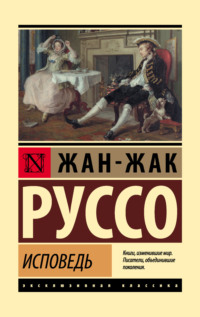 полная версия
полная версияEmile
I left him there without a light; then locking him in I went back to my bed without a word. What a noise there was! That was what I expected, and took no notice. At last the noise ceased; I listened, heard him settling down, and I was quite easy about him. Next morning I entered the room at daybreak, and my little rebel was lying on a sofa enjoying a sound and much needed sleep after his exertions.
The matter did not end there. His mother heard that the child had spent a great part of the night out of bed. That spoilt the whole thing; her child was as good as dead. Finding a good chance for revenge, he pretended to be ill, not seeing that he would gain nothing by it. They sent for the doctor. Unluckily for the mother, the doctor was a practical joker, and to amuse himself with her terrors he did his best to increase them. However, he whispered to me, "Leave it to me, I promise to cure the child of wanting to be ill for some time to come." As a matter of fact he prescribed bed and dieting, and the child was handed over to the apothecary. I sighed to see the mother cheated on every hand except by me, whom she hated because I did not deceive her.
After pretty severe reproaches, she told me her son was delicate, that he was the sole heir of the family, his life must be preserved at all costs, and she would not have him contradicted. In that I thoroughly agreed with her, but what she meant by contradicting was not obeying him in everything. I saw I should have to treat the mother as I had treated the son. "Madam," I said coldly, "I do not know how to educate the heir to a fortune, and what is more, I do not mean to study that art. You can take that as settled." I was wanted for some days longer, and the father smoothed things over. The mother wrote to the tutor to hasten his return, and the child, finding he got nothing by disturbing my rest, nor yet by being ill, decided at last to get better and to go to sleep.
You can form no idea of the number of similar caprices to which the little tyrant had subjected his unlucky tutor; for his education was carried on under his mother's eye, and she would not allow her son and heir to be disobeyed in anything. Whenever he wanted to go out, you must be ready to take him, or rather to follow him, and he always took good care to choose the time when he knew his tutor was very busy. He wished to exercise the same power over me and to avenge himself by day for having to leave me in peace at night. I gladly agreed and began by showing plainly how pleased I was to give him pleasure; after that when it was a matter of curing him of his fancies I set about it differently.
In the first place, he must be shown that he was in the wrong. This was not difficult; knowing that children think only of the present, I took the easy advantage which foresight gives; I took care to provide him with some indoor amusement of which he was very fond. Just when he was most occupied with it, I went and suggested a short walk, and he sent me away. I insisted, but he paid no attention. I had to give in, and he took note of this sign of submission.
The next day it was my turn. As I expected, he got tired of his occupation; I, however, pretended to be very busy. That was enough to decide him. He came to drag me from my work, to take him at once for a walk. I refused; he persisted. "No," I said, "when I did what you wanted, you taught me how to get my own way; I shall not go out." "Very well," he replied eagerly, "I shall go out by myself." "As you please," and I returned to my work.
He put on his things rather uneasily when he saw I did not follow his example. When he was ready he came and made his bow; I bowed too; he tried to frighten me with stories of the expeditions he was going to make; to hear him talk you would think he was going to the world's end. Quite unmoved, I wished him a pleasant journey. He became more and more perplexed. However, he put a good face on it, and when he was ready to go out he told his foot man to follow him. The footman, who had his instructions, replied that he had no time, and that he was busy carrying out my orders, and he must obey me first. For the moment the child was taken aback. How could he think they would really let him go out alone, him, who, in his own eyes, was the most important person in the world, who thought that everything in heaven and earth was wrapped up in his welfare? However, he was beginning to feel his weakness, he perceived that he should find himself alone among people who knew nothing of him. He saw beforehand the risks he would run; obstinacy alone sustained him; very slowly and unwillingly he went downstairs. At last he went out into the street, consoling himself a little for the harm that might happen to himself, in the hope that I should be held responsible for it.
This was just what I expected. All was arranged beforehand, and as it meant some sort of public scene I had got his father's consent. He had scarcely gone a few steps, when he heard, first on this side then on that, all sorts of remarks about himself. "What a pretty little gentleman, neighbour? Where is he going all alone? He will get lost! I will ask him into our house." "Take care you don't. Don't you see he is a naughty little boy, who has been turned out of his own house because he is good for nothing? You must not stop naughty boys; let him go where he likes." "Well, well; the good God take care of him. I should be sorry if anything happened to him." A little further on he met some young urchins of about his own age who teased him and made fun of him. The further he got the more difficulties he found. Alone and unprotected he was at the mercy of everybody, and he found to his great surprise that his shoulder knot and his gold lace commanded no respect.
However, I had got a friend of mine, who was a stranger to him, to keep an eye on him. Unnoticed by him, this friend followed him step by step, and in due time he spoke to him. The role, like that of Sbrigani in Pourceaugnac, required an intelligent actor, and it was played to perfection. Without making the child fearful and timid by inspiring excessive terror, he made him realise so thoroughly the folly of his exploit that in half an hour's time he brought him home to me, ashamed and humble, and afraid to look me in the face.
To put the finishing touch to his discomfiture, just as he was coming in his father came down on his way out and met him on the stairs. He had to explain where he had been, and why I was not with him. [Footnote: In a case like this there is no danger in asking a child to tell the truth, for he knows very well that it cannot be hid, and that if he ventured to tell a lie he would be found out at once.] The poor child would gladly have sunk into the earth. His father did not take the trouble to scold him at length, but said with more severity than I should have expected, "When you want to go out by yourself, you can do so, but I will not have a rebel in my house, so when you go, take good care that you never come back."
As for me, I received him somewhat gravely, but without blame and without mockery, and for fear he should find out we had been playing with him, I declined to take him out walking that day. Next day I was well pleased to find that he passed in triumph with me through the very same people who had mocked him the previous day, when they met him out by himself. You may be sure he never threatened to go out without me again.
By these means and other like them I succeeded during the short time I was with him in getting him to do everything I wanted without bidding him or forbidding him to do anything, without preaching or exhortation, without wearying him with unnecessary lessons. So he was pleased when I spoke to him, but when I was silent he was frightened, for he knew there was something amiss, and he always got his lesson from the thing itself. But let us return to our subject.
The body is strengthened by this constant exercise under the guidance of nature herself, and far from brutalising the mind, this exercise develops in it the only kind of reason of which young children are capable, the kind of reason most necessary at every age. It teaches us how to use our strength, to perceive the relations between our own and neighbouring bodies, to use the natural tools, which are within our reach and adapted to our senses. Is there anything sillier than a child brought up indoors under his mother's eye, who, in his ignorance of weight and resistance, tries to uproot a tall tree or pick up a rock. The first time I found myself outside Geneva I tried to catch a galloping horse, and I threw stones at Mont Saleve, two leagues away; I was the laughing stock of the whole village, and was supposed to be a regular idiot. At eighteen we are taught in our natural philosophy the use of the lever; every village boy of twelve knows how to use a lever better than the cleverest mechanician in the academy. The lessons the scholars learn from one another in the playground are worth a hundredfold more than what they learn in the class-room.
Watch a cat when she comes into a room for the first time; she goes from place to place, she sniffs about and examines everything, she is never still for a moment; she is suspicious of everything till she has examined it and found out what it is. It is the same with the child when he begins to walk, and enters, so to speak, the room of the world around him. The only difference is that, while both use sight, the child uses his hands and the cat that subtle sense of smell which nature has bestowed upon it. It is this instinct, rightly or wrongly educated, which makes children skilful or clumsy, quick or slow, wise or foolish.
Man's primary natural goals are, therefore, to measure himself against his environment, to discover in every object he sees those sensible qualities which may concern himself, so his first study is a kind of experimental physics for his own preservation. He is turned away from this and sent to speculative studies before he has found his proper place in the world. While his delicate and flexible limbs can adjust themselves to the bodies upon which they are intended to act, while his senses are keen and as yet free from illusions, then is the time to exercise both limbs and senses in their proper business. It is the time to learn to perceive the physical relations between ourselves and things. Since everything that comes into the human mind enters through the gates of sense, man's first reason is a reason of sense-experience. It is this that serves as a foundation for the reason of the intelligence; our first teachers in natural philosophy are our feet, hands, and eyes. To substitute books for them does not teach us to reason, it teaches us to use the reason of others rather than our own; it teaches us to believe much and know little.
Before you can practise an art you must first get your tools; and if you are to make good use of those tools, they must be fashioned sufficiently strong to stand use. To learn to think we must therefore exercise our limbs, our senses, and our bodily organs, which are the tools of the intellect; and to get the best use out of these tools, the body which supplies us with them must be strong and healthy. Not only is it quite a mistake that true reason is developed apart from the body, but it is a good bodily constitution which makes the workings of the mind easy and correct.
While I am showing how the child's long period of leisure should be spent, I am entering into details which may seem absurd. You will say, "This is a strange sort of education, and it is subject to your own criticism, for it only teaches what no one needs to learn. Why spend your time in teaching what will come of itself without care or trouble? Is there any child of twelve who is ignorant of all you wish to teach your pupil, while he also knows what his master has taught him."
Gentlemen, you are mistaken. I am teaching my pupil an art, the acquirement of which demands much time and trouble, an art which your scholars certainly do not possess; it is the art of being ignorant; for the knowledge of any one who only thinks he knows, what he really does know is a very small matter. You teach science; well and good; I am busy fashioning the necessary tools for its acquisition. Once upon a time, they say the Venetians were displaying the treasures of the Cathedral of Saint Mark to the Spanish ambassador; the only comment he made was, "Qui non c'e la radice." When I see a tutor showing off his pupil's learning, I am always tempted to say the same to him.
Every one who has considered the manner of life among the ancients, attributes the strength of body and mind by which they are distinguished from the men of our own day to their gymnastic exercises. The stress laid by Montaigne upon this opinion, shows that it had made a great impression on him; he returns to it again and again. Speaking of a child's education he says, "To strengthen the mind you must harden the muscles; by training the child to labour you train him to suffering; he must be broken in to the hardships of gymnastic exercises to prepare him for the hardships of dislocations, colics, and other bodily ills." The philosopher Locke, the worthy Rollin, the learned Fleury, the pedant De Crouzas, differing as they do so widely from one another, are agreed in this one matter of sufficient bodily exercise for children. This is the wisest of their precepts, and the one which is certain to be neglected. I have already dwelt sufficiently on its importance, and as better reasons and more sensible rules cannot be found than those in Locke's book, I will content myself with referring to it, after taking the liberty of adding a few remarks of my own.
The limbs of a growing child should be free to move easily in his clothing; nothing should cramp their growth or movement; there should be nothing tight, nothing fitting closely to the body, no belts of any kind. The French style of dress, uncomfortable and unhealthy for a man, is especially bad for children. The stagnant humours, whose circulation is interrupted, putrify in a state of inaction, and this process proceeds more rapidly in an inactive and sedentary life; they become corrupt and give rise to scurvy; this disease, which is continually on the increase among us, was almost unknown to the ancients, whose way of dressing and living protected them from it. The hussar's dress, far from correcting this fault, increases it, and compresses the whole of the child's body, by way of dispensing with a few bands. The best plan is to keep children in frocks as long as possible and then to provide them with loose clothing, without trying to define the shape which is only another way of deforming it. Their defects of body and mind may all be traced to the same source, the desire to make men of them before their time.
There are bright colours and dull; children like the bright colours best, and they suit them better too. I see no reason why such natural suitability should not be taken into consideration; but as soon as they prefer a material because it is rich, their hearts are already given over to luxury, to every caprice of fashion, and this taste is certainly not their own. It is impossible to say how much education is influenced by this choice of clothes, and the motives for this choice. Not only do short-sighted mothers offer ornaments as rewards to their children, but there are foolish tutors who threaten to make their pupils wear the plainest and coarsest clothes as a punishment. "If you do not do your lessons better, if you do not take more care of your clothes, you shall be dressed like that little peasant boy." This is like saying to them, "Understand that clothes make the man." Is it to be wondered at that our young people profit by such wise teaching, that they care for nothing but dress, and that they only judge of merit by its outside.
If I had to bring such a spoilt child to his senses, I would take care that his smartest clothes were the most uncomfortable, that he was always cramped, constrained, and embarrassed in every way; freedom and mirth should flee before his splendour. If he wanted to take part in the games of children more simply dressed, they should cease their play and run away. Before long I should make him so tired and sick of his magnificence, such a slave to his gold-laced coat, that it would become the plague of his life, and he would be less afraid to behold the darkest dungeon than to see the preparations for his adornment. Before the child is enslaved by our prejudices his first wish is always to be free and comfortable. The plainest and most comfortable clothes, those which leave him most liberty, are what he always likes best.
There are habits of body suited for an active life and others for a sedentary life. The latter leaves the humours an equable and uniform course, and the body should be protected from changes in temperature; the former is constantly passing from action to rest, from heat to cold, and the body should be inured to these changes. Hence people, engaged in sedentary pursuits indoors, should always be warmly dressed, to keep their bodies as nearly as possible at the same temperature at all times and seasons. Those, however, who come and go in sun, wind, and rain, who take much exercise, and spend most of their time out of doors, should always be lightly clad, so as to get used to the changes in the air and to every degree of temperature without suffering inconvenience. I would advise both never to change their clothes with the changing seasons, and that would be the invariable habit of my pupil Emile. By this I do not mean that he should wear his winter clothes in summer like many people of sedentary habits, but that he should wear his summer clothes in winter like hard-working folk. Sir Isaac Newton always did this, and he lived to be eighty.
Emile should wear little or nothing on his head all the year round. The ancient Egyptians always went bareheaded; the Persians used to wear heavy tiaras and still wear large turbans, which according to Chardin are required by their climate. I have remarked elsewhere on the difference observed by Herodotus on a battle-field between the skulls of the Persians and those of the Egyptians. Since it is desirable that the bones of the skull should grow harder and more substantial, less fragile and porous, not only to protect the brain against injuries but against colds, fever, and every influence of the air, you should therefore accustom your children to go bare-headed winter and summer, day and night. If you make them wear a night-cap to keep their hair clean and tidy, let it be thin and transparent like the nets with which the Basques cover their hair. I am aware that most mothers will be more impressed by Chardin's observations than my arguments, and will think that all climates are the climate of Persia, but I did not choose a European pupil to turn him into an Asiatic.
Children are generally too much wrapped up, particularly in infancy. They should be accustomed to cold rather than heat; great cold never does them any harm, if they are exposed to it soon enough; but their skin is still too soft and tender and leaves too free a course for perspiration, so that they are inevitably exhausted by excessive heat. It has been observed that infant mortality is greatest in August. Moreover, it seems certain from a comparison of northern and southern races that we become stronger by bearing extreme cold rather than excessive heat. But as the child's body grows bigger and his muscles get stronger, train him gradually to bear the rays of the sun. Little by little you will harden him till he can face the burning heat of the tropics without danger.
Locke, in the midst of the manly and sensible advice he gives us, falls into inconsistencies one would hardly expect in such a careful thinker. The same man who would have children take an ice-cold bath summer and winter, will not let them drink cold water when they are hot, or lie on damp grass. But he would never have their shoes water-tight; and why should they let in more water when the child is hot than when he is cold, and may we not draw the same inference with regard to the feet and body that he draws with regard to the hands and feet and the body and face? If he would have a man all face, why blame me if I would have him all feet?
To prevent children drinking when they are hot, he says they should be trained to eat a piece of bread first. It is a strange thing to make a child eat because he is thirsty; I would as soon give him a drink when he is hungry. You will never convince me that our first instincts are so ill-regulated that we cannot satisfy them without endangering our lives. Were that so, the man would have perished over and over again before he had learned how to keep himself alive.
Whenever Emile is thirsty let him have a drink, and let him drink fresh water just as it is, not even taking the chill off it in the depths of winter and when he is bathed in perspiration. The only precaution I advise is to take care what sort of water you give him. If the water comes from a river, give it him just as it is; if it is spring-water let it stand a little exposed to the air before he drinks it. In warm weather rivers are warm; it is not so with springs, whose water has not been in contact with the air. You must wait till the temperature of the water is the same as that of the air. In winter, on the other hand, spring water is safer than river water. It is, however, unusual and unnatural to perspire greatly in winter, especially in the open air, for the cold air constantly strikes the skin and drives the perspiration inwards, and prevents the pores opening enough to give it passage. Now I do not intend Emile to take his exercise by the fireside in winter, but in the open air and among the ice. If he only gets warm with making and throwing snowballs, let him drink when he is thirsty, and go on with his game after drinking, and you need not be afraid of any ill effects. And if any other exercise makes him perspire let him drink cold water even in winter provided he is thirsty. Only take care to take him to get the water some little distance away. In such cold as I am supposing, he would have cooled down sufficiently when he got there to be able to drink without danger. Above all, take care to conceal these precautions from him. I would rather he were ill now and then, than always thinking about his health.
Since children take such violent exercise they need a great deal of sleep. The one makes up for the other, and this shows that both are necessary. Night is the time set apart by nature for rest. It is an established fact that sleep is quieter and calmer when the sun is below the horizon, and that our senses are less calm when the air is warmed by the rays of the sun. So it is certainly the healthiest plan to rise with the sun and go to bed with the sun. Hence in our country man and all the other animals with him want more sleep in winter than in summer. But town life is so complex, so unnatural, so subject to chances and changes, that it is not wise to accustom a man to such uniformity that he cannot do without it. No doubt he must submit to rules; but the chief rule is this—be able to break the rule if necessary. So do not be so foolish as to soften your pupil by letting him always sleep his sleep out. Leave him at first to the law of nature without any hindrance, but never forget that under our conditions he must rise above this law; he must be able to go to bed late and rise early, be awakened suddenly, or sit up all night without ill effects. Begin early and proceed gently, a step at a time, and the constitution adapts itself to the very conditions which would destroy it if they were imposed for the first time on the grown man.
In the next place he must be accustomed to sleep in an uncomfortable bed, which is the best way to find no bed uncomfortable. Speaking generally, a hard life, when once we have become used to it, increases our pleasant experiences; an easy life prepares the way for innumerable unpleasant experiences. Those who are too tenderly nurtured can only sleep on down; those who are used to sleep on bare boards can find them anywhere. There is no such thing as a hard bed for the man who falls asleep at once.
The body is, so to speak, melted and dissolved in a soft bed where one sinks into feathers and eider-down. The reins when too warmly covered become inflamed. Stone and other diseases are often due to this, and it invariably produces a delicate constitution, which is the seed-ground of every ailment.
The best bed is that in which we get the best sleep. Emile and I will prepare such a bed for ourselves during the daytime. We do not need Persian slaves to make our beds; when we are digging the soil we are turning our mattresses. I know that a healthy child may be made to sleep or wake almost at will. When the child is put to bed and his nurse grows weary of his chatter, she says to him, "Go to sleep." That is much like saying, "Get well," when he is ill. The right way is to let him get tired of himself. Talk so much that he is compelled to hold his tongue, and he will soon be asleep. Here is at least one use for sermons, and you may as well preach to him as rock his cradle; but if you use this narcotic at night, do not use it by day.









